Key takeaways:
- The death penalty raises significant moral and ethical questions about the justification of taking a life in the name of justice.
- Concerns about wrongful convictions highlight the irreversible nature of capital punishment and the inherent bias within the justice system.
- Alternatives such as life imprisonment without parole and restorative justice focus on rehabilitation and healing rather than punishment.
- Stories of wrongful convictions underline the human cost of a flawed justice system and the need for reform to prevent executing the innocent.
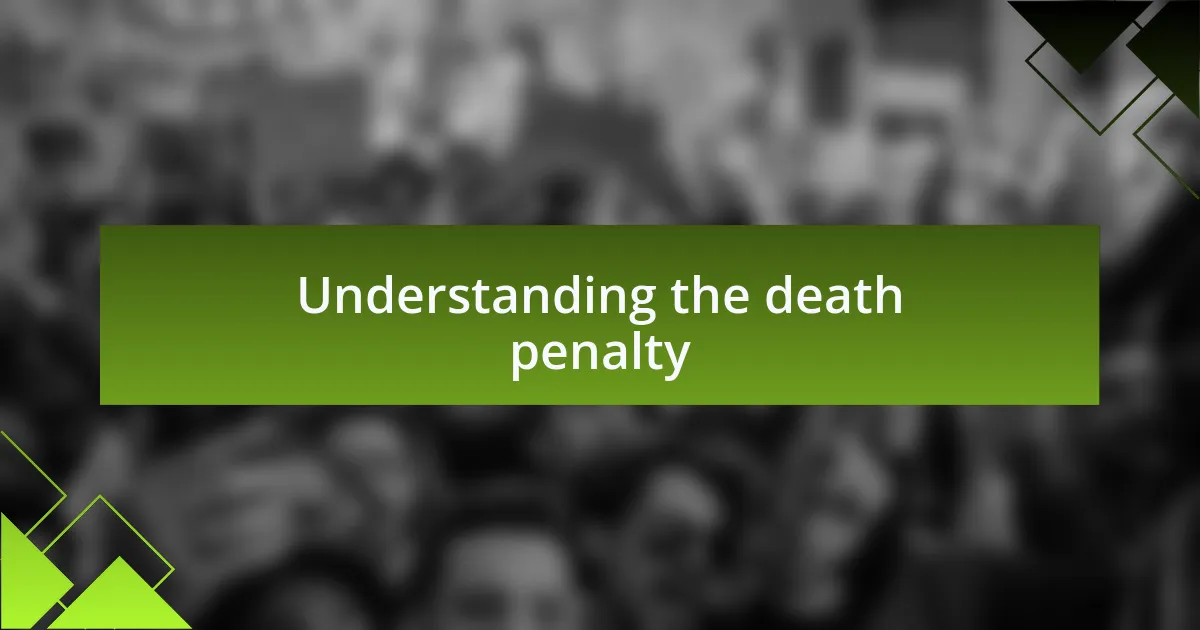
Understanding the death penalty
The death penalty, often viewed as a social contract of sorts, carries significant implications for our moral and ethical framework. I remember grappling with the question: can we, as a society, justify the finality of taking a life in the name of justice? It’s a heavy burden, reflecting not just on the state of law, but on our collective conscience.
At its core, the death penalty is intended to serve as a deterrent against heinous crimes. Yet, I often find myself questioning its effectiveness. Does the threat of execution truly prevent violent actions, or does it simply perpetuate a cycle of vengeance? The statistics don’t always line up with the common belief, leading me to ponder the true role of capital punishment in our justice system.
Moreover, the human aspect of the death penalty cannot be overlooked. When I think about the families of victims and the condemned alike, it’s clear that the repercussions extend far beyond the courtroom. How can one penalty serve justice when it so deeply fractures lives on all sides? This complexity makes understanding the death penalty not just an intellectual exercise, but a deeply emotional journey.
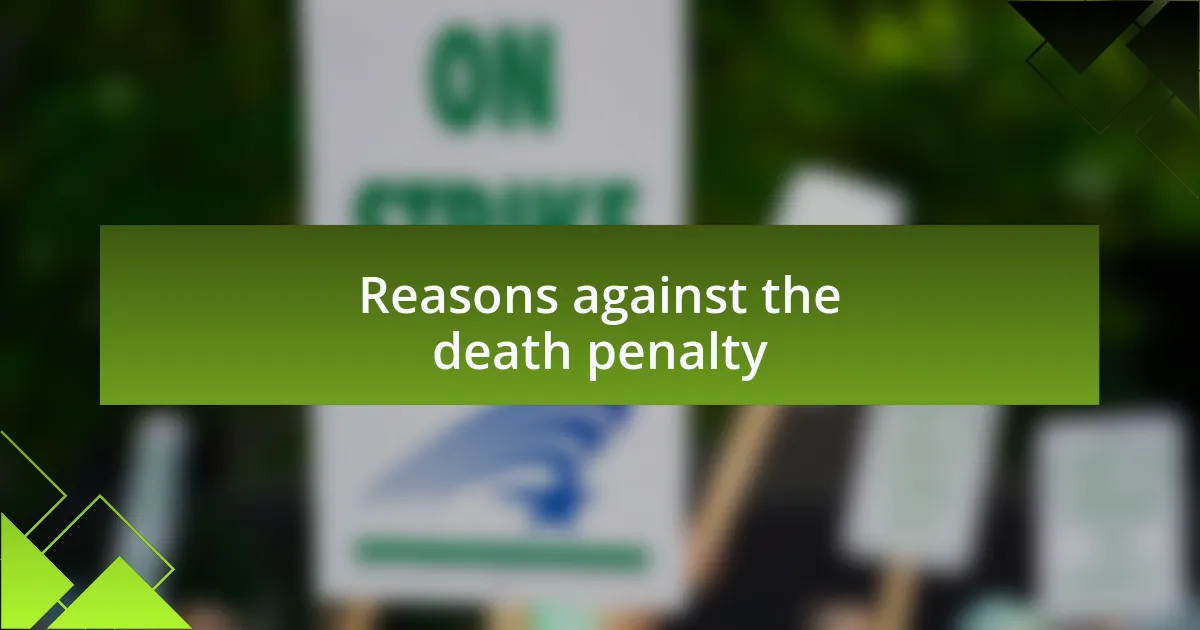
Reasons against the death penalty
When discussing reasons against the death penalty, I often think about the irreversible nature of capital punishment. What if we convict the wrong person? I remember reading about cases where new evidence exonerated individuals after decades on death row. It sent chills down my spine, reminding me that once a life is taken, there’s no going back. This realization forces me to question our justice system’s infallibility.
Another crucial reason is the inherent bias in sentencing. The disparities based on race and socioeconomic status are striking. I can’t shake the feeling that the system isn’t fair. How can justice be served when certain groups are disproportionately affected? It’s disheartening to realize that a person’s fate may hinge on factors beyond their control, which undermines the very essence of equality we strive for in our society.
Moreover, the financial burden of the death penalty cannot be ignored. I learned that maintaining death row inmates and the lengthy legal processes can be far more expensive than life imprisonment. This made me reflect: what are we really prioritizing? If our resources are limited, wouldn’t investing in more effective crime prevention and rehabilitation methods yield better results for society? The financial and moral implications leave me pondering the true cost of capital punishment.
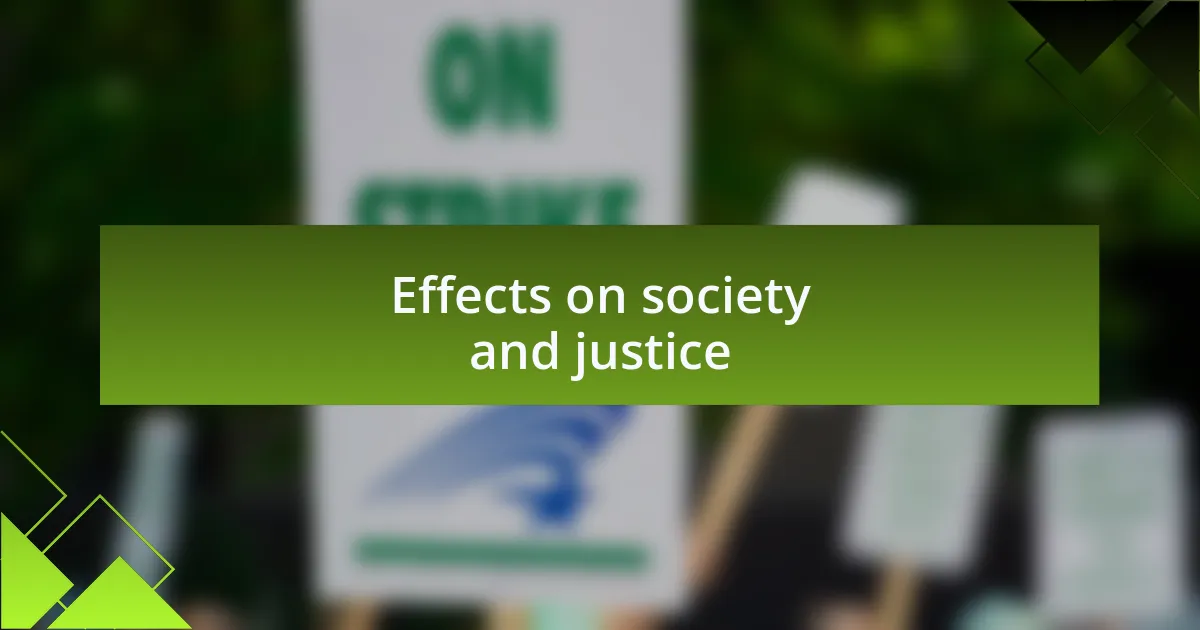
Effects on society and justice
When I think about the effects of the death penalty on society, I often wonder about the chilling message it sends. It seems to suggest that violence is an acceptable solution to violence. In my experience, how can we build a society that values life when we, as a collective, are willing to sanction death? This contradiction gnaws at my conscience.
Furthermore, the justice system suffers when capital punishment is on the table. I recall a conversation with a former public defender who shared their frustration over the pressure to secure convictions, sometimes leading to shortcuts in due process. It’s troubling to consider that the pursuit of a death sentence can overshadow the quest for true justice, potentially compromising the integrity of legal proceedings. How can we trust a system that might prioritize punishment over fairness?
Lastly, I can’t help but think about how the death penalty breeds a culture of fear rather than one of healing. I once attended a community forum where survivors of violent crimes discussed their pain. Many expressed that they sought justice, not vengeance. Wouldn’t it be more impactful if our society focused on restorative justice, enabling healing for victims and communities? This shift in perspective could lead to a more compassionate approach that truly uplifts our communities.
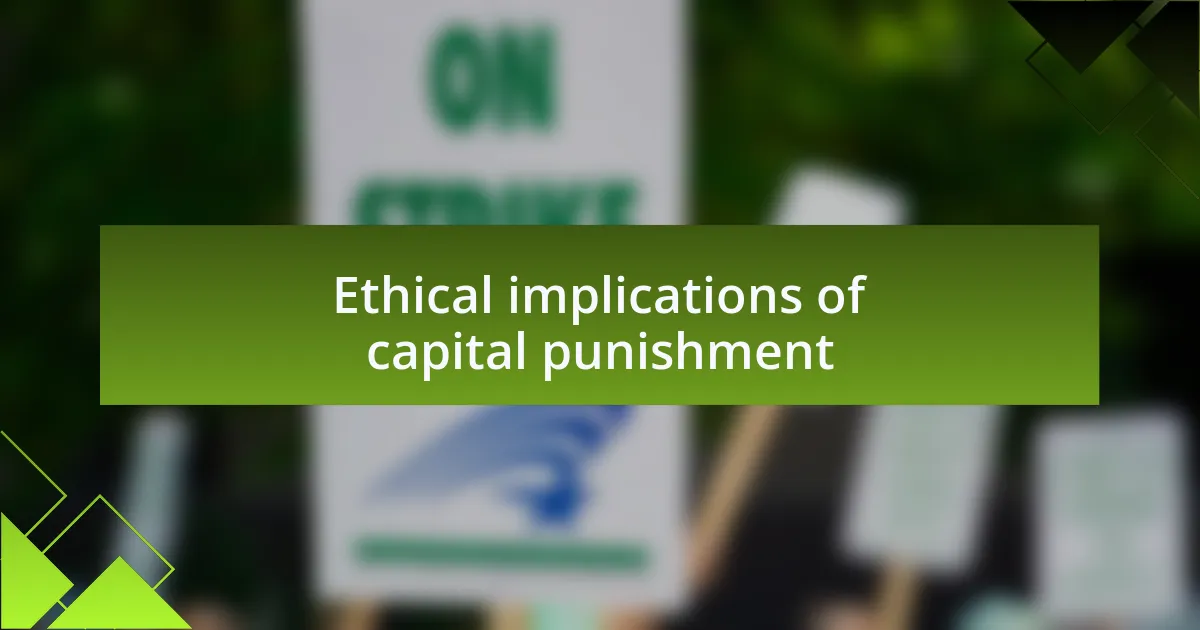
Ethical implications of capital punishment
When I reflect on the ethical implications of capital punishment, I find myself grappling with the fundamental question of humanity. Is it ethical for us to decide who deserves to live or die? I remember a debate I had with a close friend, who argued that some crimes justify the death penalty. Yet, I couldn’t shake the feeling that this stance dehumanizes us all; it reduces the value of life to mere transactions in a legal system.
Consider the often-ignored reality that wrongful convictions can occur. I once read the story of a man who spent decades on death row only to be exonerated through new DNA evidence. How can we justify a system that risks executing innocent individuals? The ethical weight of taking a life is immense, and it forces us to confront the uncomfortable truth that justice can be fallible. Are we truly comfortable living in a society where irreversible mistakes can be made with the gravest of consequences?
Moreover, embracing capital punishment often sidesteps the root causes of crime. In conversations I’ve had with social workers, it’s evident that poverty, mental health issues, and systemic inequalities play significant roles in criminal behavior. Instead of focusing on punishment, shouldn’t we be investing in addressing these root issues? Redirecting our energies toward prevention and rehabilitation could create a more ethical and just society, one where we prioritize healing over retribution.
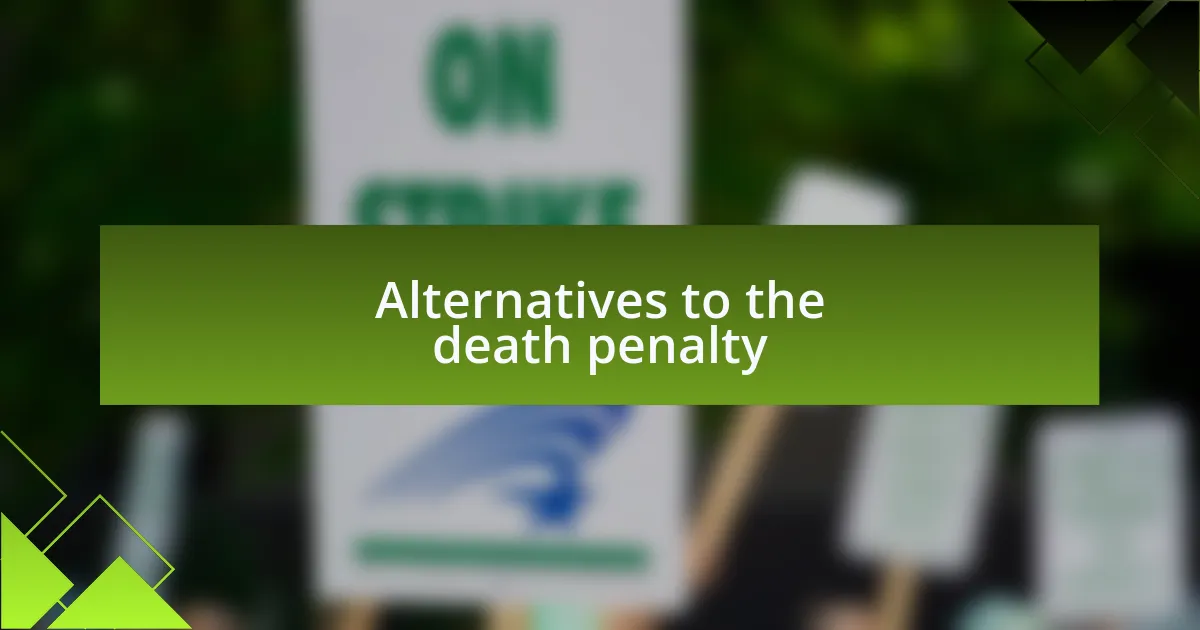
Alternatives to the death penalty
One compelling alternative to the death penalty is life imprisonment without parole. In my own life, I’ve met individuals who have turned their lives around in prison. It’s inspiring to hear stories of personal redemption and growth. Shouldn’t our justice system allow for the possibility of such transformation, rather than closing the door permanently?
Another approach that deserves attention is restorative justice. This method centers on repairing the harm caused by crime through dialogue and understanding. I once attended a workshop where victims of crime met with offenders and shared their stories. The emotional weight in the room was palpable, and it became clear that both parties found a semblance of healing. Wouldn’t it be powerful if we could create a system that fosters reconciliation rather than simply punishment?
Furthermore, investing in mental health and rehabilitation services can yield long-term benefits. Reflecting on my community, I’ve noticed that proactive support for individuals struggling with mental illness can prevent future crimes. Why not shift our resources to treatment rather than solely focusing on retribution? It’s time we consider these alternatives that honor human life and promote healing.
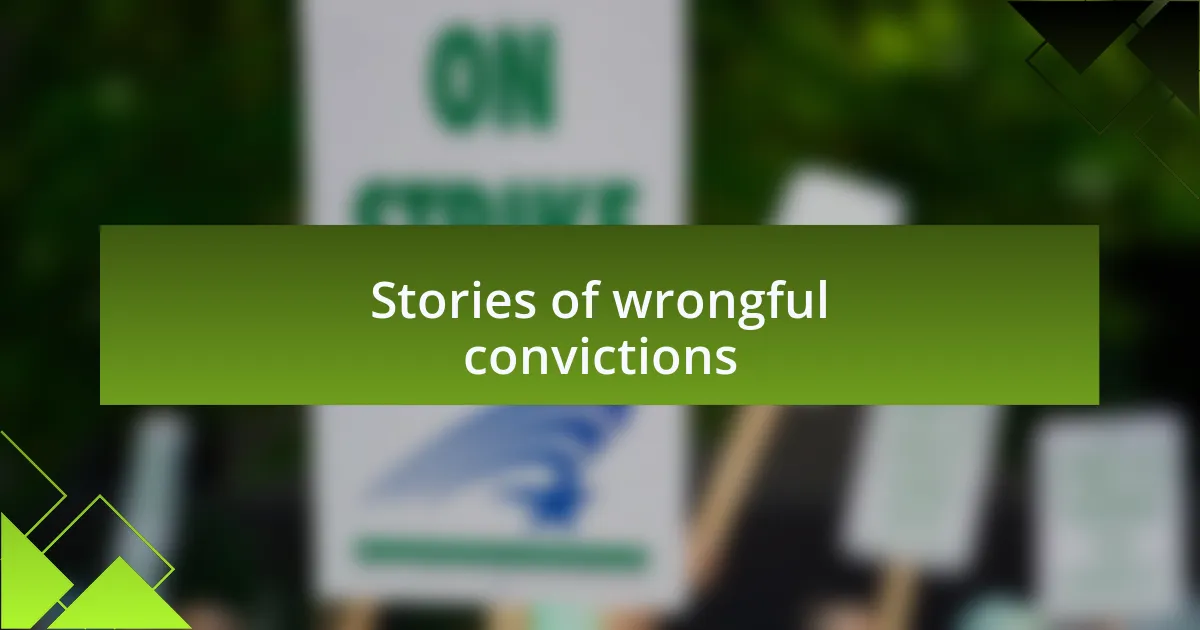
Stories of wrongful convictions
The stories of wrongful convictions illustrate the very real human cost of a flawed justice system. Take the case of Anthony Ray Hinton, who spent nearly 30 years on death row for crimes he didn’t commit. During that time, I can’t help but think about the isolation and despair he must have felt, and it raises an important question: how many lives are shattered under the weight of a conviction based on faulty evidence?
Another poignant example is the story of West Memphis Three, who were wrongfully convicted in a case filled with mishandled evidence and media sensationalism. Their fight for justice spanned over 18 years and shows us just how fragile the concept of guilt can be. When I consider their struggle, I wonder how many innocent people might still be behind bars, their stories untold and their potential for redemption lost.
Then there’s the case of Cameron Todd Willingham, who was executed based on disputed arson evidence. Learning about his tragic ending left me questioning the integrity of our justice system. It’s heartbreaking to think about the families left behind, and I find myself asking: should we not reconsider the morality of a system that takes such irreversible actions without absolute certainty?